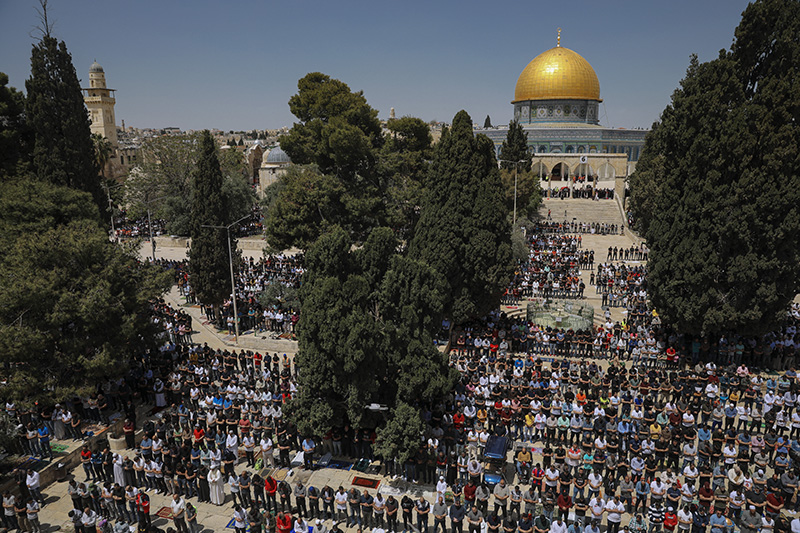JERUSALEM (RNS) — When Ramadan began on April 12, Yusef Sublaban said a silent prayer thanking God for the opportunity to observe the Muslim holy month the way it is meant to be observed: in a mosque, and surrounded by friends and loved ones.
“Thanks to Allah, this Ramadan the mosques are open, we can leave our homes and break our fast together. What a difference from last Ramadan!” Sublaban said with a joyful smile as he urged a rare visitor to buy something from his souvenir shop in the Old City of Jerusalem.
Last year, Israel was under a strict lockdown to thwart the spread of COVID-19. Worshippers were forbidden to pray at mosques, synagogues and churches, even during Ramadan, Passover and Easter.
Since then, of the country’s citizens and residents 16 or older, about 80% have been vaccinated. Most hospitals have shuttered their COVID wards for lack of patients.
RELATED: New players add volatility in Jerusalem tensions
Thanks to the vaccination campaign, Muslims in Israel have been able to pray at a mosque, including Al-Aqsa, during Ramadan — provided they adhere to rules such as wearing a mask indoors and social distancing.
“This year, Ramadan feels sweeter. People are joyful to be back at the mosque,” said Sheikh Mohammed Abu Obeid, a judge in Israel’s Shariah court system. “They can resume their spiritual life and activities. We are really blessed.”
The inability to gather together last Ramadan was heartbreaking, the judge said. The communal nature of Ramadan, which revolves around the mosque, helping the needy and spending time with friends and family, is spiritually uplifting. The inability to gather together last Ramadan, said Abu Obeid, “was frustrating and heartbreaking.”
“Many people felt the virus was a punishment from God for their sins. Now they feel God has given them back their mosque.”
There have been some remaining concerns. Many Muslims in the West Bank and Israel are worried about their loved ones in Gaza, where a shortage of vaccines and widespread reluctance to be vaccinated have led to yet another COVID-19 spike.
The Hamas-led government is planning to impose a nightly COVID-related curfew starting Thursday (April 29), a move that will force mosques to close for evening prayers, Reuters reported.
And while the pandemic’s “silver lining” was a sense of countrywide solidarity and reduction of war and terrorism in Israel, societal rifts have resurfaced along with its reopening. Young Arabs have attacked religious Jews and shared the attacks on TikTok, while young Jewish nationalists have marched through the streets of Jerusalem shouting “Death to Arabs.”
But even these incidents, and the remaining COVID restrictions, have not dampened the enthusiasm for the return of “real” Ramadan, Abu Obeid said. “The capacity inside the mosques is still somewhat limited. We still can’t pray shoulder-to-shoulder, and instead of 20 praying in a line, now seven to 10 pray in a line, 1.5 meters apart. But we are grateful.”
There is no restriction on the number of people who can pray outdoors, so the Al-Aqsa compound in Jerusalem has been packed with thousands of worshippers.
The reopening of restaurants in time for Ramadan, the sheikh said, allows Muslims to break their daily fast with others. “People can get together again. Things are moving in the right direction,” Abu Obeid said.
Mohammed Mansour, an Old City leather merchant, said Ramadan “is so much more beautiful this year.”
Although the government “was justified” in locking down the country much of the past year, “I felt like I had lost something when I wasn’t able to go to the mosque,” Mansour said, referring to Al-Aqsa, the third-holiest site in Islam, located just a few hundred yards away from his shoe and handbag shop.
Aside from the communal prayers, Mansour excitedly described the iftar meals he has shared with family and friends.
“We visit them, they visit us. We’re not alone anymore.”
Khalil Assali, editor and founder of the website akhbarelbalad.net, said things “are almost back to normal” in the Palestinian West Bank this Ramadan.
“People can buy sweets and be together for iftar, Assali said. “Some of the restaurants are hosting families for iftar, and the mosques are open.”
RELATED: Cairo’s historic Ramadan cannon fires again
Sublaban, the shopkeeper, said he will pray for the restoration of peace in the holy city and for tourists to return after a year’s absence. Israel closed its borders to all but a few non-Israeli visitors almost as soon as the pandemic began.
“It’s Ramadan and it’s difficult to put food on the table,” Sublaban said, gazing at the long, empty pedestrian road in the Old City’s normally crowded Christian Quarter. “Please Allah, the pandemic will end and the pilgrims will return.”





